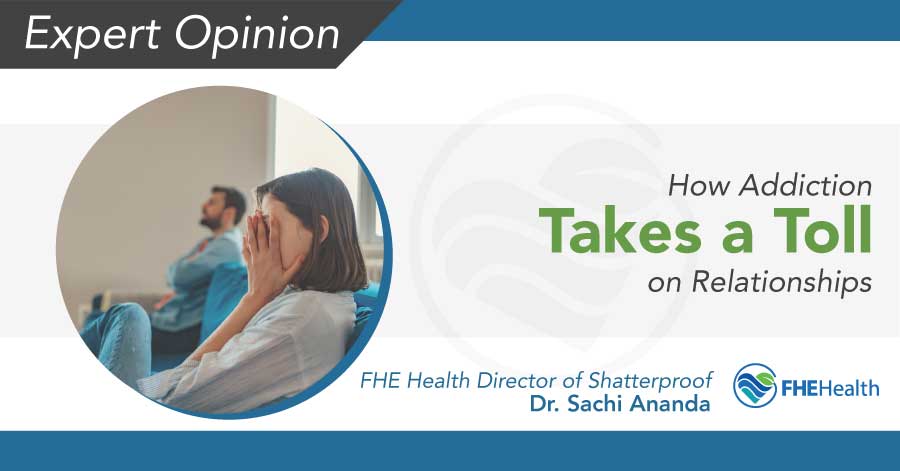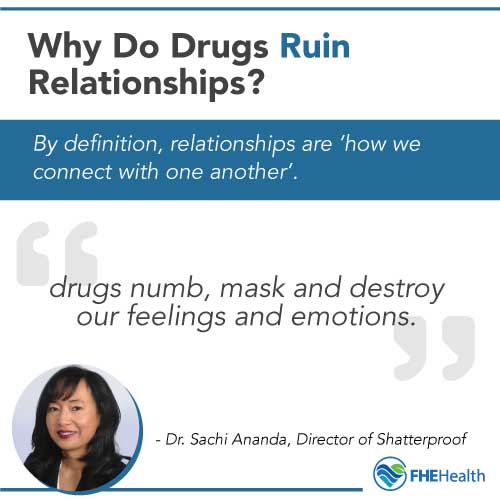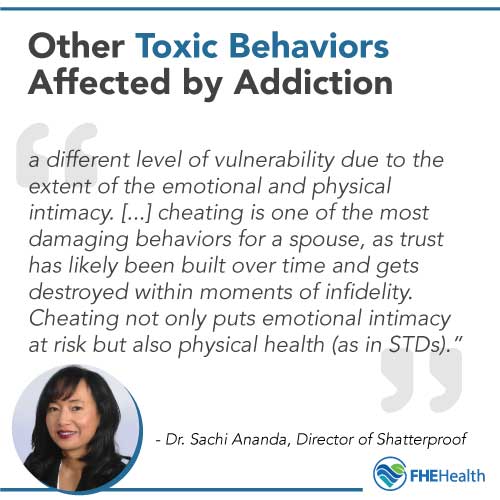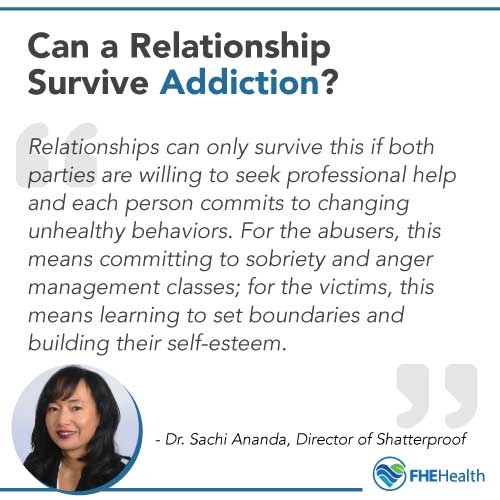
This article has been reviewed for accuracy by our peer review team which includes clinicians and medical professionals. Learn more about our peer review process.
The impact of addiction on relationships is unquestionable. Anyone struggling with addiction quickly discovers that it’s impossible to maintain the destructive behaviors of a drug or alcohol problem without affecting their close relationships with family and friends. Likewise, anyone with an addicted partner—who may have been physically or emotionally absent this Valentine’s Day—can attest to the devastating, relational fallout of a drug or alcohol problem.
For the addicted person, knowing how their disease has hurt or ruined their relationships is a critical first step towards recovery. They’re not alone: Spouses and other close family members can also benefit from understanding and addressing the toxic dynamics of addiction and how it affects a relationship. Only then can the door to healing open.
As a certified sex and relationships therapist, Dr. Sachi Ananda is a frequently consulted authority on the issue of addiction and relationships at FHE Health, where she is also the director of FHE’s treatment program for first responders. In a recent interview, she discussed the various ways in which addiction takes a toll on relationships, based on her firsthand experience with patients in early recovery and their loved ones. She also tackled some of the harder issues associated with addiction and relationships, such as drug-or-alcohol-related domestic violence and whether a relationship can survive after drug addiction.
 Why Do Drugs Ruin Relationships?
Why Do Drugs Ruin Relationships?
Drugs do so much damage to relationships because they strike at the very heart of what it means to be in a relationship. By definition, relationships are how we connect with one another, according to Dr. Ananda, whereas “drugs numb, mask and destroy our feelings and emotions.”
Dr. Ananda went on to explain that “drugs by their nature serve to disconnect people from reality— including the person right in front of them.” The result: “If individuals cannot identify or experience their true feelings, then how can they connect with other people in a genuine and meaningful way?”
How Are Relationships Affected by Addiction?
The disease of addiction is characterized by destructive and unhealthy behaviors that often “go hand in hand with drug use.” In this sense, addiction is “not just about the use of the drug itself” but “often includes relationship killers like lying, cheating, stealing, selfishness, irresponsibility and manipulating.”
“When these addictive behaviors enter into relationships, they destroy trust, mutual respect, a sense of safety, and emotional intimacy,” Dr. Ananda said.
Certain addiction-related behaviors can be especially toxic for a relationship. From her experience, Dr. Ananda believes lying “causes the most damage to both spousal and familial relationships.” Consider why, in her words:
If a spouse discovers, for example, that his or her spouse had lied about going to the store and went to a bar to drink instead, then that may feel similar to being cheated on. In fact, the drug becomes like a substitute lover that you are willing to lie for and cover up about.
Lying is hard for families because oftentimes there may be an inherent desire to help another family member rather than to unintentionally hurt them. For example, if an older brother gives his younger brother money to help pay bills and finds out it was used to buy drugs, not only is trust broken but the older brother feels worse that he may have hurt his brother.
 What Other Toxic Behaviors in Relationships are a Result of Addiction?
What Other Toxic Behaviors in Relationships are a Result of Addiction?
In a spousal or other serious romantic relationship, sex introduces “a different level of vulnerability due to the extent of the emotional and physical intimacy.” In this context, Dr. Ananda said that “cheating is one of the most damaging behaviors for a spouse, as trust has likely been built over time and gets destroyed within moments of infidelity. Cheating not only puts emotional intimacy at risk but also physical health (as in STDs).”
Stealing is another toxic behavior associated with addiction that can destroy family relationships, according to Dr. Ananda. She pointed out that in family systems where family members “may tend to inherently trust each other just from sheer blood association,” stealing can rock trust to such a degree that it calls into question many if not all behaviors on the part of the addicted loved one.
Do Drugs Lead to Domestic Violence in Relationships?
Domestic violence is another particularly egregious behavior that tends to occur at higher rates in addiction-affected households. Dr. Ananda noted that “domestic violence coupled with addiction can be even more confusing than just violence alone because the loved one may want to excuse or rationalize this behavior because he or she was intoxicated.”
Meanwhile, the victim of the violence “may continue to put up with the abuse in hopes that sobriety may stop the violence.” They may also struggle with self-blame— a common dynamic among victims of domestic violence, many of whom “feel they did something wrong or lacked something that triggered their partner’s drug use and ensuing violence.” Dr. Ananda also recommended that anyone reading this now who may be experiencing domestic violence should call their local, toll-free domestic violence number immediately for help with resources in their area.
 The good news is that addiction treatment can help heal relationships. Dr. Ananda has seen these sorts of recoveries happen frequently: “There are many examples of this, too many to tell!,” she exclaimed. She gave one example of the many:
The good news is that addiction treatment can help heal relationships. Dr. Ananda has seen these sorts of recoveries happen frequently: “There are many examples of this, too many to tell!,” she exclaimed. She gave one example of the many:





